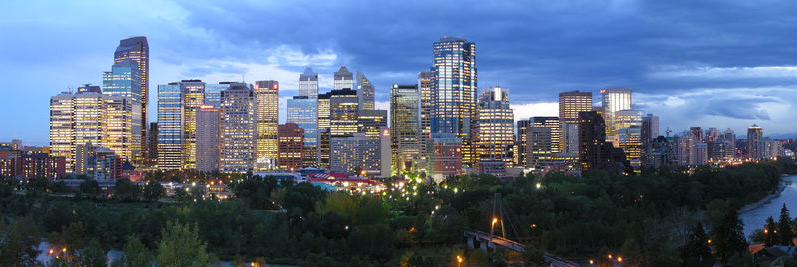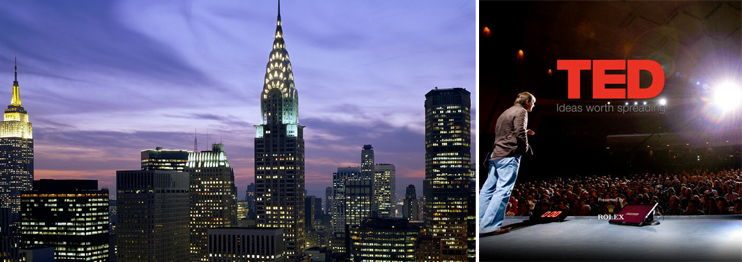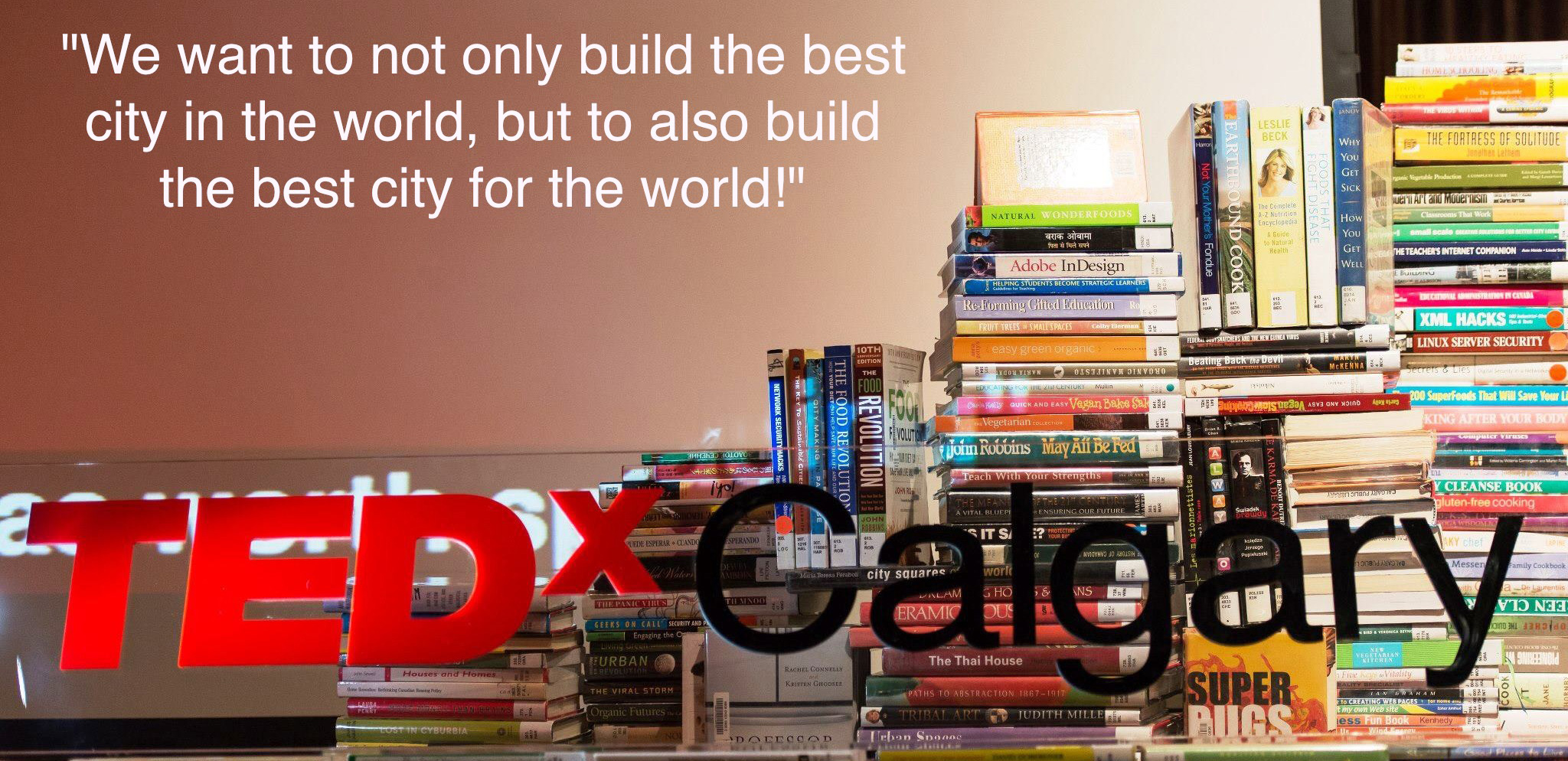Team:Calgary/Outreach/TEDxCalgary
From 2012.igem.org
Emily Hicks (Talk | contribs) |
|||
| (28 intermediate revisions not shown) | |||
| Line 4: | Line 4: | ||
<html> | <html> | ||
| - | < | + | <h2> Check Out Our Talk! </h2> |
| - | < | + | <p> This year our team had the opportunity to partner with <a href="http://tedxcalgary.ca/events/city-2-0" target="_blank">TEDxCalgary</a> in developing a TEDx talk which we presented on October 13th in Calgary. This was a great opportunity to present to not only our city, but also a part of a larger, international event. We had a lot of fun thinking about synthetic biology and our project and the best way to share that in an inspirational and meaningful way.</p> |
| - | <p> | + | <p>Find our talk after the Regional Jamboree on the <a href="http://www.youtube.com/user/TEDxCalgary" target="_blank">TEDxCalgary Youtube Channel</a>.</p> |
| - | </html> [[File: | + | </html>[[File:UofC_CiTYPicture.png|700px|centre]]<html> |
<h2> City 2.0 </h2> | <h2> City 2.0 </h2> | ||
| - | <p>Our talk | + | <p>Our talk was part of <a href="http://www.thecity2.org/" target="_blank"> City 2.0</a>. This international event was awarded the <a href="http://www.tedprize.org/the-city-2-0/" target="_blank">TED prize</a> of the year, which occurred concurrentlly in over 50 cities around the world on October 13th. This event was inspired by many ideas around building vibrant and sustainable cities, but is trying to move on to the next step: taking action. The themes involve Art, Food, Education, Public Space, Health and more! The ultimate goal is to create the city of the future that are “inclusive, innovative, healthy, soulful, and thriving!”</p> |
| - | + | </html>[[File:UofC_City_2.0_Picture.png|700px|centre]] | |
| + | <html> | ||
| + | <h2> "Ideas Worth Spreading" </h2> | ||
| + | <p>In accordance with TED’s mandate, we needed an idea worth spreading. We had a lot of ideas about our project, the iGEM competition and synthetic biology in general. The hard part was coming up with the right theme for our presentation; one that would resonate with the general public both within and outside Alberta. | ||
| + | One of the reasons we chose the project that we did is that it is something important to Alberta but that can also have implications around the globe – environment and energy. There are obvious implications of our project for the oil sands in Alberta, but also to a broader audience in terms of environmental remediation. This was clearly an important theme to us. We felt that the fact that the bacteria we are designing can not only remediate wastes, but can convert them into reusable fuels was particularly important. Every day, the landfills around the world have been growing incessantly. Communicating the potential for applying synthetic biology to clean or recycle the wastes and reclaim these lands would be an interesting focus. What is more exciting is the potential that synthetic biology gives to maintain a self-sustainable environment. Instead of relying on the city for energy and waste processing, we could use synthetic biology to clean our cities and generate energy from waste products for our cities.<br></p> | ||
| + | </html>[[File:TEDxCalgary for the city.jpg|700px|centre]]<html> | ||
| + | |||
| + | <p><br>Outside of the environmental implications of our project, open source was also an interesting theme as it is a major underlying premise of both synthetic biology and iGEM in general. The open access nature coupled with the drive for abstraction in synthetic biology make it something with huge potential for participation, something missing from other scientific fields. The amount of knowledge required to master biology is immense, but building systems with standard parts is not so hard. Just take a look at the things coming out of iGEM each year and you’ll understand. Undergraduates on small budgets can accomplish quite a lot in a summer! This idea of democratizing science was thus another angle worth exploring.</p> | ||
| + | |||
| + | <p>The theme we chose to go with was merging these two. We wanted to emphasize the potential synthetic biology could have in remediation, while showing that this technology can be used by many, allowing people to actively participate in science and synthetic biology, and in turn help improve the environment. | ||
| + | Through our TED talk, we want to emphasize the democratization of science and generate new discussions and ideas for improving our health and our cities’ health through better environment, raising more questions on how to build a self-sustainable city! | ||
| + | </p> | ||
| + | |||
| + | <h2> Building Healthy and Self-Sustaining Cities: Big Problems and Small Solutions </h2> | ||
| + | |||
| + | <div style="float:left;"> | ||
| + | <div style="width: 70%; float:left;"><p> In our talk, we hoped to give people a peek into the fascinating world of synthetic biology. In addition, we hoped to inspire people to take actions in working together to building better cities and healthier environments, by following their passions and using science. The story was developed around how we use the smallest living organism to take on some of the toughest challenges we face as a society, overcoming adversity and being creative with our limited resources. The talk raised people’s interests in joining the revolution of democratizing science. It also raised questions on how looking beyond the ordinary and realizing the potentials of insignificant things can potentially change the world.</p></div><div style="width: 30%; font-size:16px; float:right;"><p>“What bacteria hold in billions of years of evolution is the key to the revolution of healthy and self-sustaining cities!”<br><p style="font-size:15px; text-align: right;"> — Jay Wang</p></p></div> | ||
| + | |||
| + | </div> | ||
| + | |||
| + | <div style="float:left;"> | ||
| + | <img style="width: 35%; margin-left: 20px; float:left;" src="https://static.igem.org/mediawiki/2012/9/91/UCalgary2012_TED_Talk_Jay.png"></img> | ||
| + | |||
| + | <div style="width: 62%; float:left;"><p>The talk was very successful and received overwhelming feedback from the audience! Our topic sparked numerous discussions in both online and offline communities. There were people walking up to our speaker and saying that they were very inspired and intrigued by the talk; audiences surrounded our speaker with questions and comments right after the talk expressing interests in the ideas. There were high school students who want to be where we are when they are in university and who expressed interest in joining the team. Also, there were national media approaching us for potential interviews. We had supporters from the university at the talk as well - one of our university staff went to the TEDx event primarily to listen to our talk. </p></div> | ||
| + | </div> | ||
</html> | </html> | ||
}} | }} | ||
Latest revision as of 21:28, 26 October 2012


Hello! iGEM Calgary's wiki functions best with Javascript enabled, especially for mobile devices. We recommend that you enable Javascript on your device for the best wiki-viewing experience. Thanks!
TEDxCalgary
Check Out Our Talk!
This year our team had the opportunity to partner with TEDxCalgary in developing a TEDx talk which we presented on October 13th in Calgary. This was a great opportunity to present to not only our city, but also a part of a larger, international event. We had a lot of fun thinking about synthetic biology and our project and the best way to share that in an inspirational and meaningful way.
Find our talk after the Regional Jamboree on the TEDxCalgary Youtube Channel.
City 2.0
Our talk was part of City 2.0. This international event was awarded the TED prize of the year, which occurred concurrentlly in over 50 cities around the world on October 13th. This event was inspired by many ideas around building vibrant and sustainable cities, but is trying to move on to the next step: taking action. The themes involve Art, Food, Education, Public Space, Health and more! The ultimate goal is to create the city of the future that are “inclusive, innovative, healthy, soulful, and thriving!”
"Ideas Worth Spreading"
In accordance with TED’s mandate, we needed an idea worth spreading. We had a lot of ideas about our project, the iGEM competition and synthetic biology in general. The hard part was coming up with the right theme for our presentation; one that would resonate with the general public both within and outside Alberta.
One of the reasons we chose the project that we did is that it is something important to Alberta but that can also have implications around the globe – environment and energy. There are obvious implications of our project for the oil sands in Alberta, but also to a broader audience in terms of environmental remediation. This was clearly an important theme to us. We felt that the fact that the bacteria we are designing can not only remediate wastes, but can convert them into reusable fuels was particularly important. Every day, the landfills around the world have been growing incessantly. Communicating the potential for applying synthetic biology to clean or recycle the wastes and reclaim these lands would be an interesting focus. What is more exciting is the potential that synthetic biology gives to maintain a self-sustainable environment. Instead of relying on the city for energy and waste processing, we could use synthetic biology to clean our cities and generate energy from waste products for our cities.
Outside of the environmental implications of our project, open source was also an interesting theme as it is a major underlying premise of both synthetic biology and iGEM in general. The open access nature coupled with the drive for abstraction in synthetic biology make it something with huge potential for participation, something missing from other scientific fields. The amount of knowledge required to master biology is immense, but building systems with standard parts is not so hard. Just take a look at the things coming out of iGEM each year and you’ll understand. Undergraduates on small budgets can accomplish quite a lot in a summer! This idea of democratizing science was thus another angle worth exploring.
The theme we chose to go with was merging these two. We wanted to emphasize the potential synthetic biology could have in remediation, while showing that this technology can be used by many, allowing people to actively participate in science and synthetic biology, and in turn help improve the environment. Through our TED talk, we want to emphasize the democratization of science and generate new discussions and ideas for improving our health and our cities’ health through better environment, raising more questions on how to build a self-sustainable city!
Building Healthy and Self-Sustaining Cities: Big Problems and Small Solutions
In our talk, we hoped to give people a peek into the fascinating world of synthetic biology. In addition, we hoped to inspire people to take actions in working together to building better cities and healthier environments, by following their passions and using science. The story was developed around how we use the smallest living organism to take on some of the toughest challenges we face as a society, overcoming adversity and being creative with our limited resources. The talk raised people’s interests in joining the revolution of democratizing science. It also raised questions on how looking beyond the ordinary and realizing the potentials of insignificant things can potentially change the world.
“What bacteria hold in billions of years of evolution is the key to the revolution of healthy and self-sustaining cities!”
— Jay Wang

The talk was very successful and received overwhelming feedback from the audience! Our topic sparked numerous discussions in both online and offline communities. There were people walking up to our speaker and saying that they were very inspired and intrigued by the talk; audiences surrounded our speaker with questions and comments right after the talk expressing interests in the ideas. There were high school students who want to be where we are when they are in university and who expressed interest in joining the team. Also, there were national media approaching us for potential interviews. We had supporters from the university at the talk as well - one of our university staff went to the TEDx event primarily to listen to our talk.
 "
"


